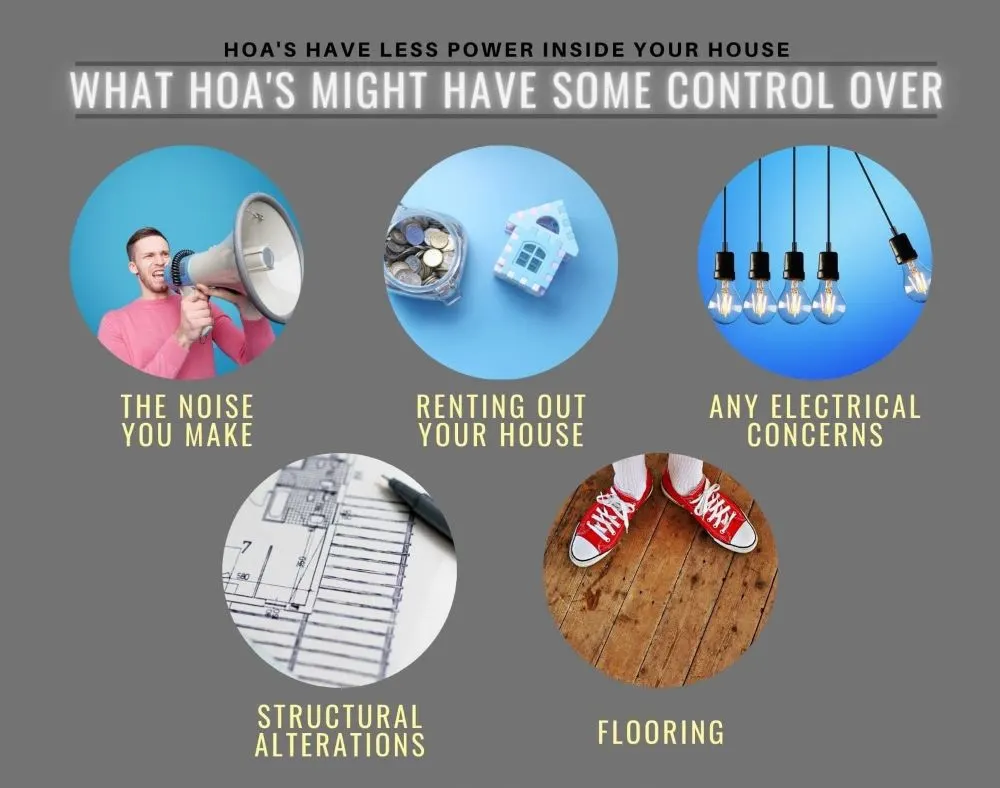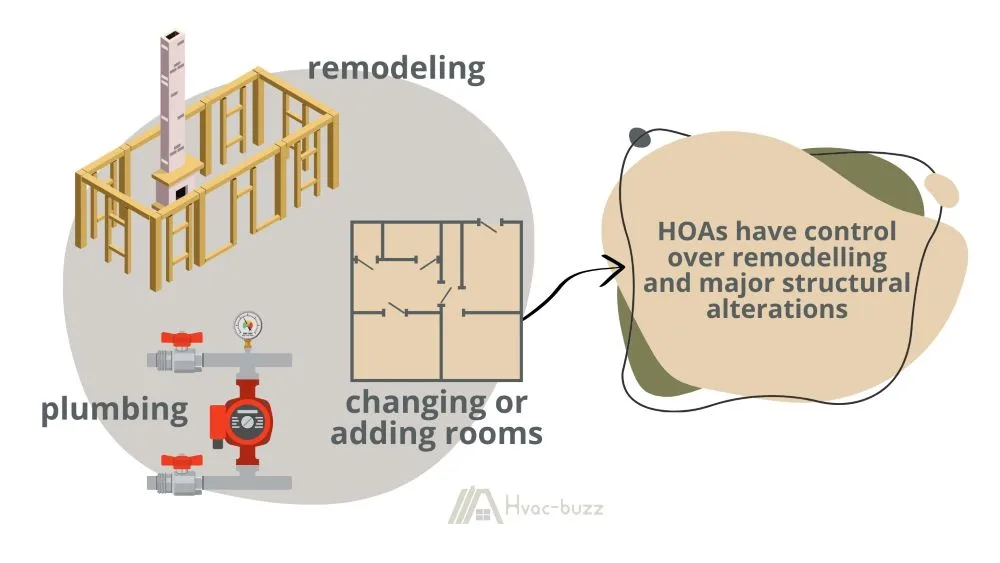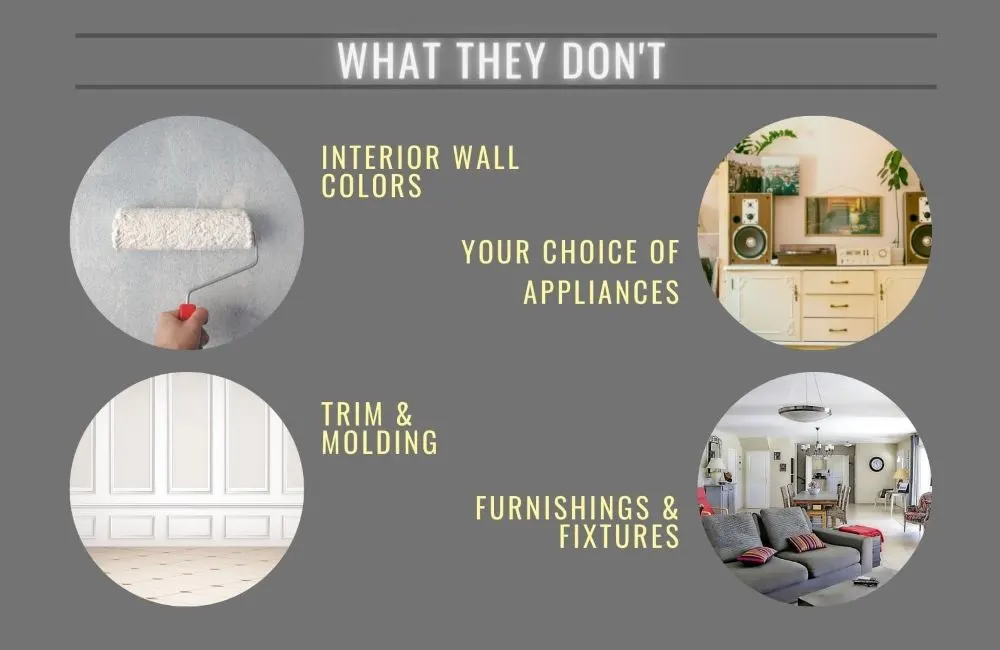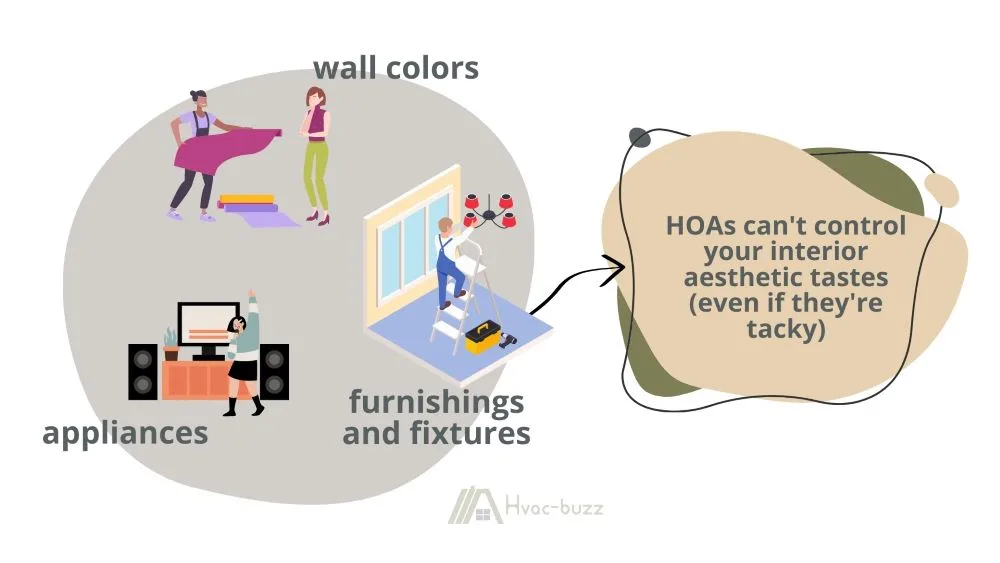I never want to be told what to do inside my house. I am sure you too feel the same. But, living in a building or a property that has multiple owners inevitably means having to deal with the HOA. The HOA rules and regulations will dictate your life one way or the other.
You expect HOAs to implement mandates in common areas like the swimming pool, gym, etc. But can HOA enforce rules inside your own house? Can it tell you what to do or not do inside your own house? I will be answering all these questions and more in this article.

HOAs have more say over the exterior of your house than the interior. However, they can restrict electrical work, noise-making activities, renting out your house or apartment, structural alterations, and changing your flooring (more applicable to condominiums).
Read Your HOA CC&Rs
Having an HOA might feel like your rights as a mortgage-paying homeowner are being compromised a bit. But, trust me having an effective HOA has its advantages. HOAs exist to maintain the integrity and overall well-being of a property and its residents.
Always remember not all HOAs are the same. So, it is always best if you are very familiar with the prohibitions of your HOA’s CC&Rs as well as all the things that you can do but only with permission. So, check your own HOA CC&Rs for specific limitations and make sure you have the most updated CC&Rs.
HOAs Have Less Power Over the Inside of Your House
When it comes to your house, HOA rules regulate what you do with the outside of your house and your yard. For example, you might have to paint your front gate the color that is mentioned in the HOA agreement, which you received when purchasing your home.
If you are already wondering whether an HOA can wield its power inside your house, then the answer is yes it can. However, HOA rules are usually limited to activities that you do inside your home that might affect your neighbor like throwing a loud bash.
HOAs Might Have Some Control Over:

How Much Noise You Make
In any development, most complaints are made about the noise level. From loud birthday parties to after-school band practices, residents can object to any activity that is disturbing their peace. So, it is obvious for HOA to implement strict rules to regulate the noise level inside your house.
Most cities and countries have noise ordinances to protect a citizen’s right to a quiet environment. Similarly, HOAs have all kinds of noise restrictions as a part of their rules and regulations to curb noise-related complaints.
HOA rules usually restrict loud noises during a certain time like maybe from 11 pm to 7 am. It is always better to follow the HOA rules because if you don’t follow then you can be held accountable and can also be fined.
Window AC Units
Installing a window ac unit is both inside and outside of your house. However, the sight of the installed unit and the noise they produce mean they are almost always banned or at least controlled by the HOA. If you are trying to get one installed in your home, you should read HOA Denied Window AC? We have solutions!
Renting out Your House
Most neighborhoods or condominium buildings with HOAs have rental and subletting policies because of two primary reasons. Security being the most common reason and the second reason is community insurance. Most community insurances depend upon the percentage of owners versus renters.
Your HOA might not deny you to rent out your property but you will require written permission. If you do rent your home, then bear in mind that you will be responsible for any damages or violations your tenant commits.
Some strict HOAs also prohibit listing your house on Airbnb or any home-sharing, short-term, or vacation rental website. If you do want to rent your property to supplement your income and recoup some of the HOA fees as a tax-deductible, then you must check your building’s HOA regulations.
Take a Detour
Can HOA Restrict Guests (Know your rights)
Anything Electrical
HOAs regulate some electrical works to reduce the risk of causing a fire that might put the whole building at risk. However, small minor electrical work related to light fixtures, including switches and outlets does not typically need permission from the HOA.
In case you are planning something that involves rewiring or adding electrical then you will have to get permission from your HOA. Before choosing a contractor, find out if your HOA has a list of approved contractors experienced in working on HOA properties.
Structural Alterations/Remodeling
HOA exists to maintain and improve property values by ensuring that exterior and interior renovations comply with the community’s rules and regulations. Structural alterations or remodeling like removing interior or exterior walls, moving plumbing, or changing or adding rooms, including major bathroom or kitchen renovations, require written permission from HOA.
Some HOA communities insist on the job being undertaken by a licensed professional and might give permission only after checking the credentials of the contractor. The HOA will inspect the renovation upon completion to ensure it meets its standard of quality and complies with the community rules.
When it comes to structural alterations or remodeling, HOAs allocate a certain period during which owners are allowed to have construction going on. Most importantly, make sure to remove dust and debris from common areas after the construction work.

Changing Your Flooring
If you ever lived below someone who had hard flooring then you must have experienced the constant noise of chairs being dragged or someone walking with hard sole shoes. This is precisely the reason why HOA regulates the flooring inside your home.
If you are planning to replace your flooring with something like wood, laminate, vinyl, etc. then you will need permission from the HOA. Most HOAs mandate that floor coverings need to have a soundproof quality to make sure that the residents living downstairs do not get disturbed.
HOAs Do Not Typically Regulate:

Interior Wall Colors
Your interior wall colors can be whatever you please. The decoration inside your home reflects your taste and does not affect the overall community aesthetics. Hence, HOAs cannot tell you what color to paint on the interior but the exterior color has to be the color that’s specified in your HOA’s CC&Rs.
This exterior color standardization is done to maintain the aesthetic appeal of your property. It is a part of the HOAs’ duty to make sure that the development looks beautiful to a visitor.
Trim and Molding
Interior trim, like baseboards or crown molding, is a part of the interior of your home so there are no HOA rules to tell you what you can or cannot do. Trim and molding are installed to conceal gaps between walls, floors, and ceiling. Trim and molding protect surfaces from impact while giving them a more finished look.
Most HOAs have no mandates regarding trim and molding but just to be in the clear, check your CC&Rs to avoid violating any rules when installing, replacing, and/or improving your trim and molding.
What Appliances You Have
When it comes to appliances, you have the liberty to own whatever you want in your home. The only catch is that the appliance must not disturb your neighbors. HOA will only get involved if the appliance is intruding on the peace of the community with excessive noise or light.
Furnishings and Fixtures
When it comes to furnishings and fixtures, HOA rules are limited only to your exterior. For any kind of fixtures or furnishing inside the home, like adding/replacing the shower and the sink, you don’t need to notify the HOA.
If you are planning to get some work done to the exterior of your home, like changing the front door, you will need to keep the HOA in the loop.

Do I Have to Let an HOA Rep Into My House?
If your mentality is “what they don’t see can’t hurt them”, make sure you are certain about their entry rights into your home. You may have to let an HOA rep into your house under special circumstances like during an emergency (most common) or for inspection/maintenance.
All the rules related to an HOA rep entering your home are mentioned in your HOA CC&Rs or by-laws. State law, however, takes precedent, so if the rules say they can and the law says they can’t, then it is illegal for them to exercise this “right”. You can read my article on Unenforceable HOA Rules for more examples like this.
Both HOA governing documents and state statutes specify that the HOA needs to give prior notice to the homeowner before sending a rep. The only time this particular rule doesn’t apply is in case of emergencies when a rep will enter your home in your absence to prevent damage like a fire outbreak.
Sometimes, you have to let the HOA rep enter your home to perform common element inspections, maintenance, and repairs. This happens if your home contains systems that serve the entire condominium like common plumbing or air ducts. In houses, it will be a less common allowance.
If your HOA feels that you are violating a rule, then it will have the right to send a rep to your home. For this, HOAs need to have a very good reason to believe that a violation has taken place. For example, certain HOAs have strict rules about having a barbecue party on a private balcony that’s made of wood or brick. If your HOA feels you are violating this rule, then a rep has the right to come for an inspection.
As an owner, living in a development with an HOA, the best thing is to always have a copy of the latest HOA CC&Rs handy. This will save you lots of time and money. At the end of the day, having an HOA has its advantages.
Source
https://www.hoaleader.com/members/229.cfm
https://www.bundrenlaw.com/blog/2021/may/do-i-need-the-hoa-s-approval-for-interior-renova2/
https://www.hopb.co/hoa-state-laws
https://cedarmanagementgroup.com/hoa-approval-renovations/#which
https://www.hoamanagement.com/renovating-a-home-in-an-hoa-what-you-should-know/
